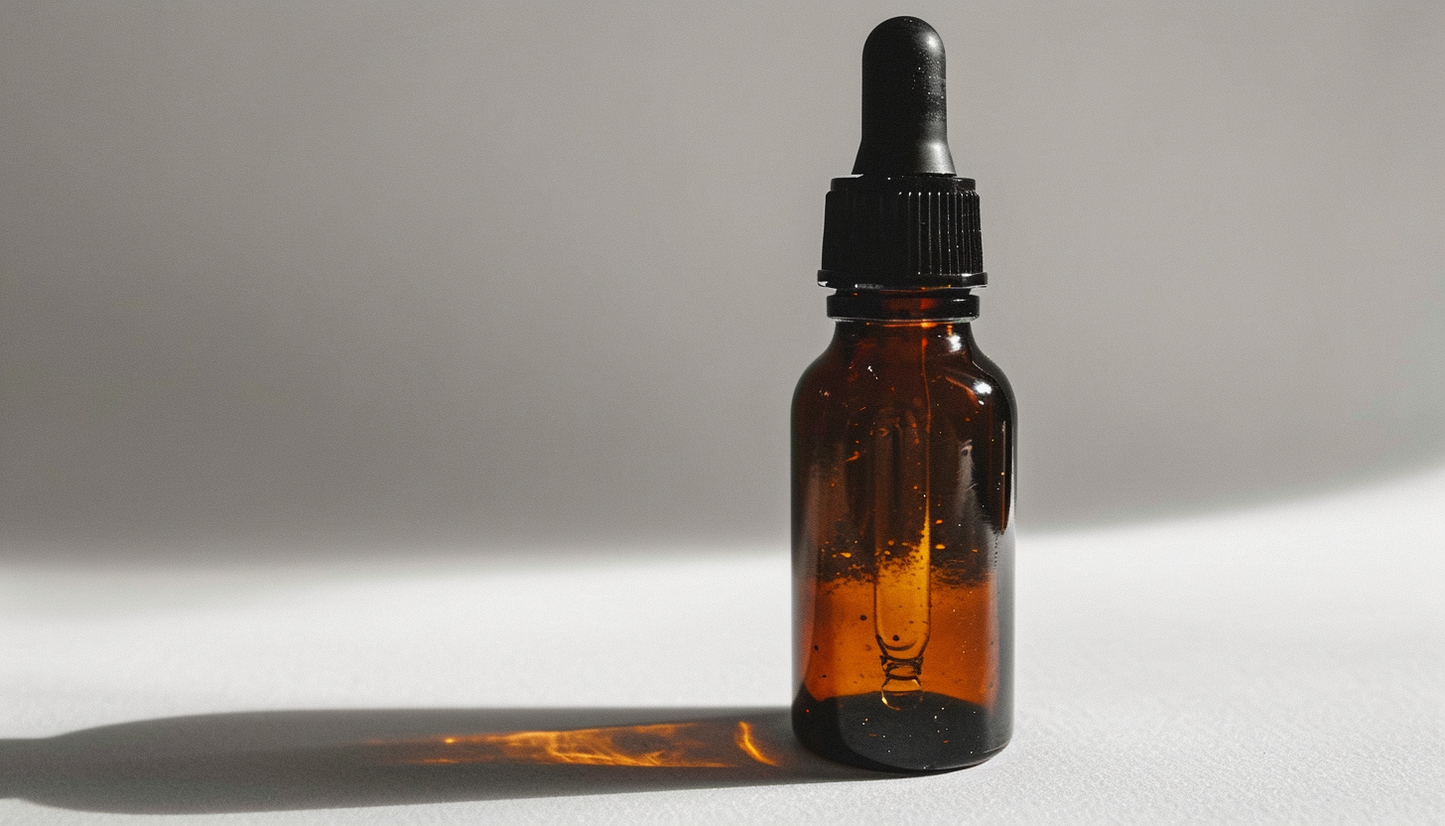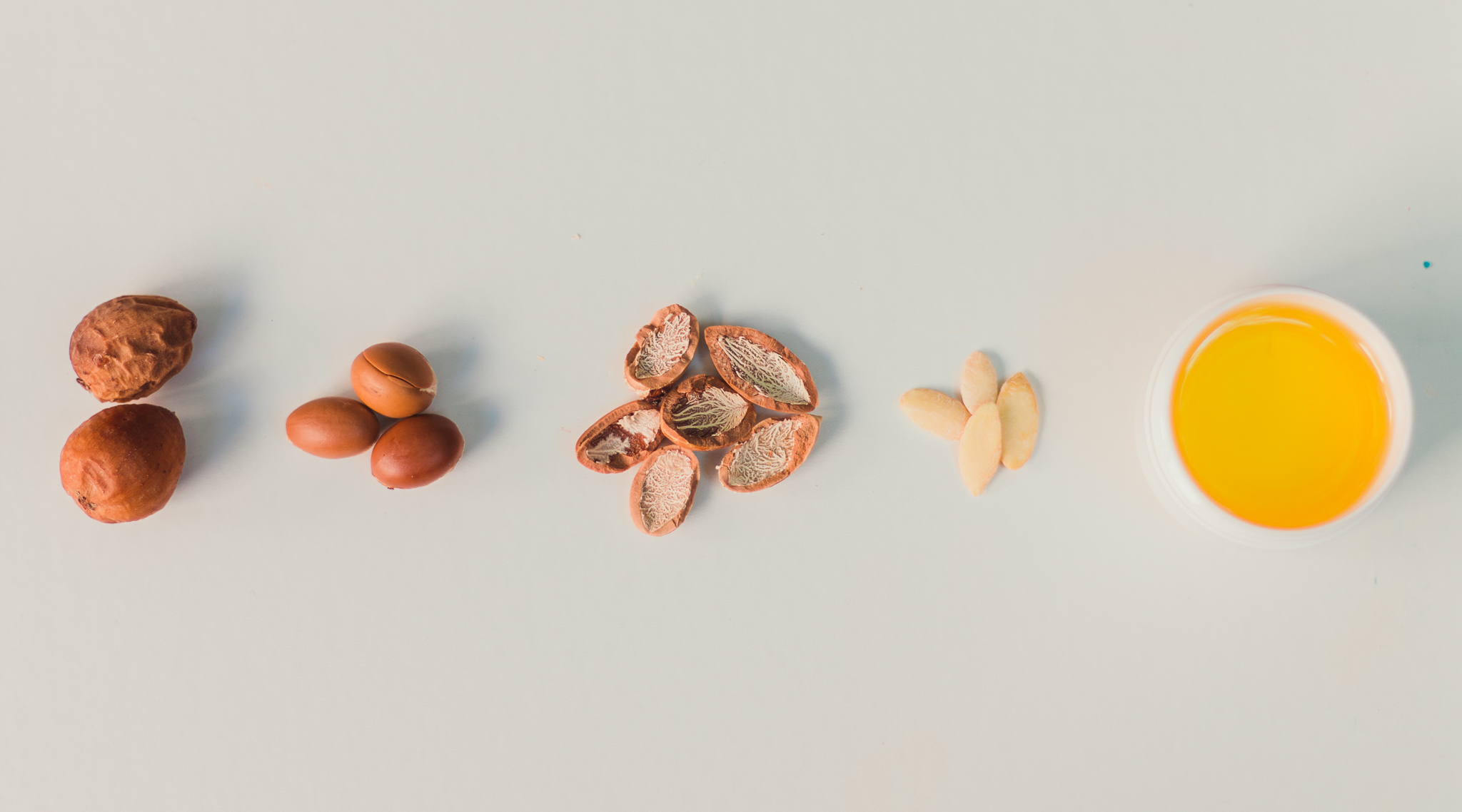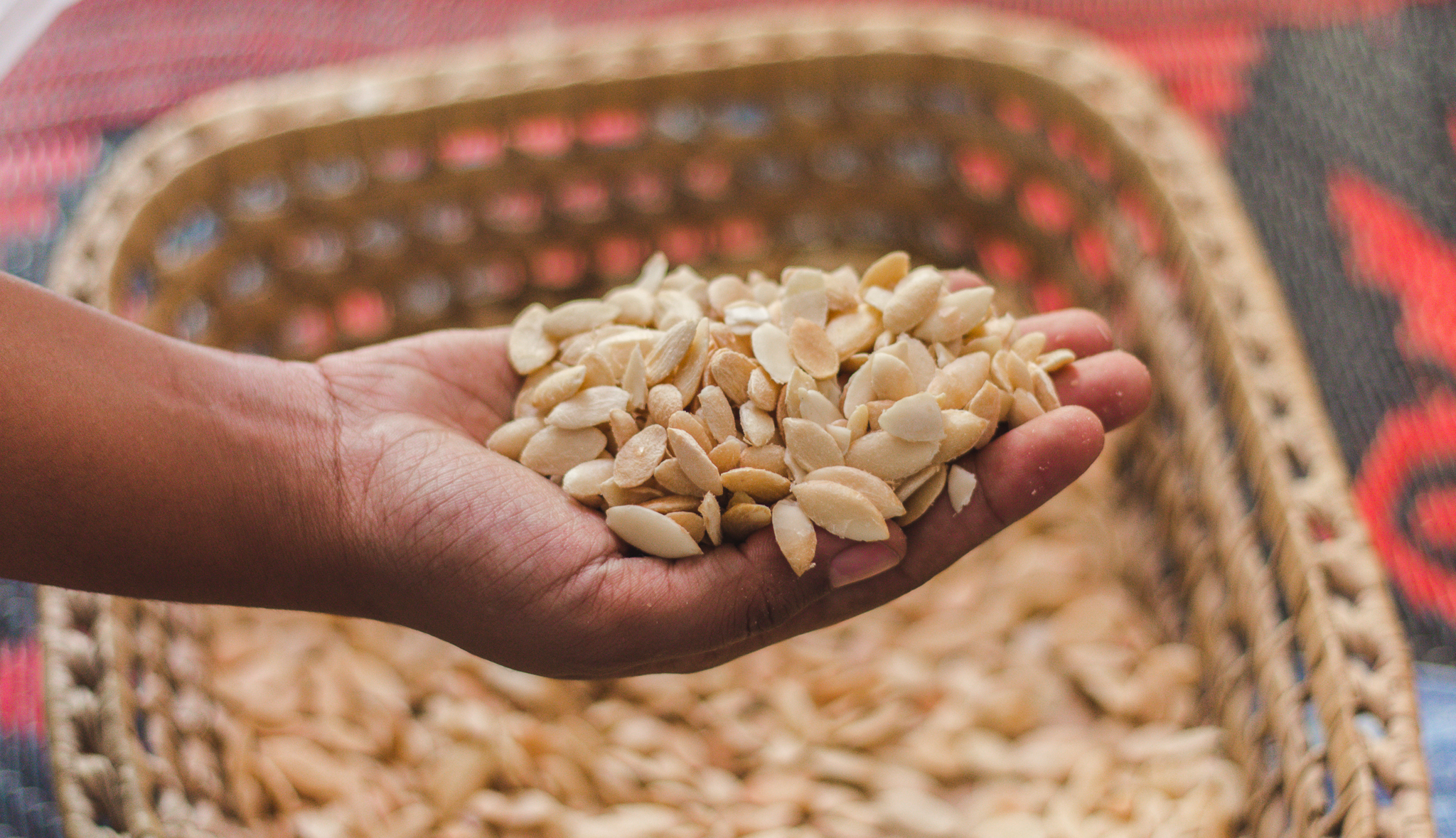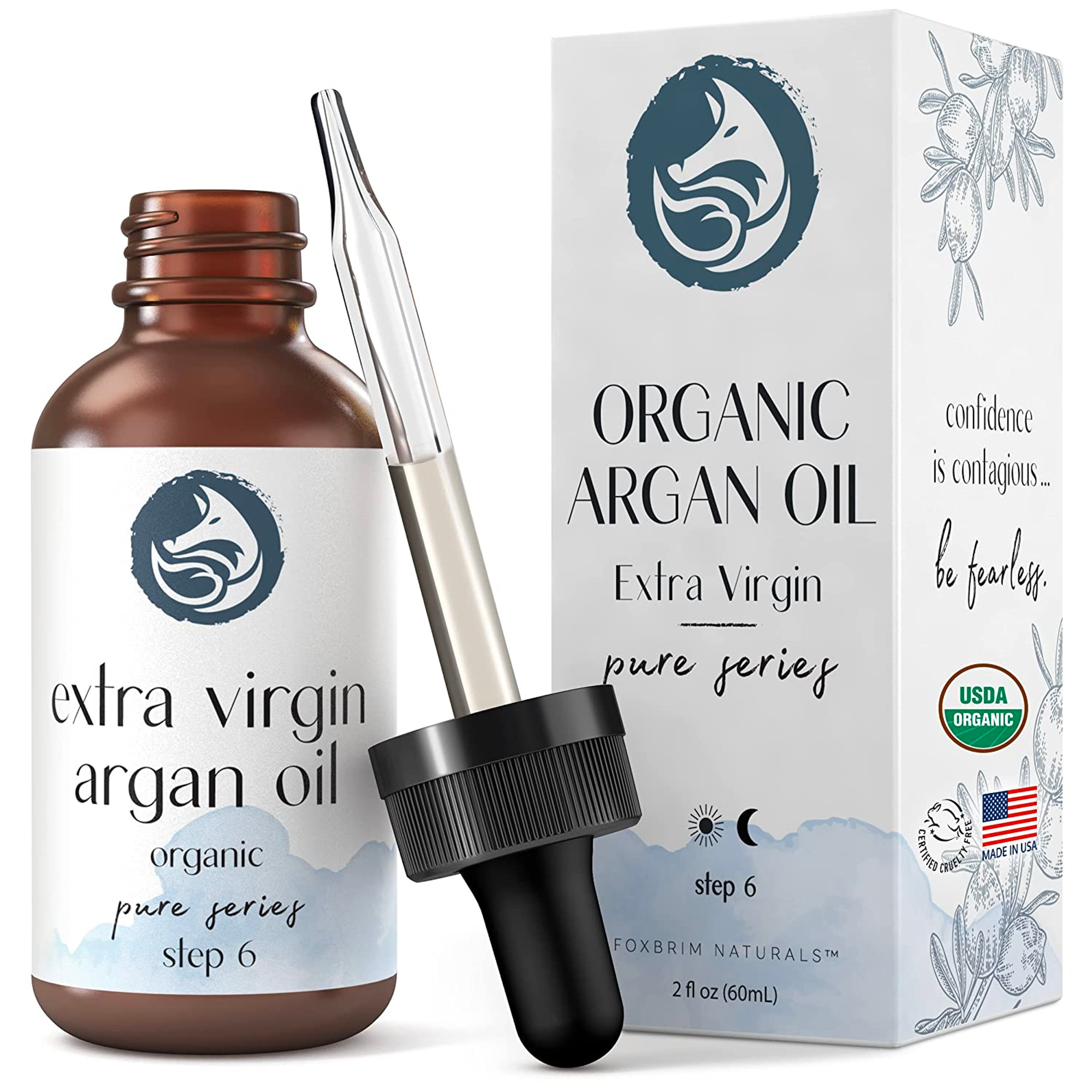
by Luann Koerper, Founder of Foxbrim Naturals
Argan oil has become increasingly popular in recent years due to its numerous benefits for both skin and hair. However, with so many different products on the market, it can be difficult to determine which is best for you. One of the ways that consumers can make an informed decision is by looking for organic labeling on the products they purchase.
Organic labeling is a way for consumers to know that their product has been produced without harmful chemicals or pesticides. This can be especially important for products like argan oil, which is often used on sensitive skin.
In this article, we will explore what organic labeling means for argan oil and why it is important for consumers to understand. We will also address some common misconceptions about organic labeling and provide tips for avoiding misleading labeling practices.

Photo by Foxbrim Naturals, 2023.
In this article
- What is Argan Oil?
- What are the Uses of Organic Argan Oil?
- What is the Extraction Process of Organic Argan Oil?
- What Does Organic Labeling Mean?
- What are the Certifications for Argan Oil?
- What Are the Requirements for Organic Labeling on Argan Oil?
- Understanding the USDA Organic Certification Process
- What Do Organic Labels Mean for Consumers?
- Choosing the Right Organic Argan Oil Products
- Misconceptions About Organic Labeling on Argan Oil
- Best Argan Oil in the Market
What is Argan Oil?
Argan oil is a natural oil that is extracted from the kernels of the argan tree, which is native to Morocco. This oil has been used for centuries in Moroccan cuisine for its medicinal properties. In recent years, argan oil has become popular in the beauty industry for its numerous benefits for both skin and hair.
Argan oil is rich in vitamin E, essential fatty acids, and antioxidants, making it an excellent moisturizer for both skin and hair. It is often used to treat dry, damaged hair, as well as to soothe and hydrate dry skin.
Photo by Foxbrim Naturals, 2022.
What are the Uses of Organic Argan Oil?
Argan oil is a versatile product that can be used in a variety of ways. Some of the most common uses for argan oil include:
- Moisturizer and Soaps: Argan oil is a rich moisturizer that can be used to hydrate dry skin. It is especially effective for use on areas that are prone to dryness, such as the elbows, knees, and feet. Moreover, it can also be used in soaps to hydrate the skin.
- Hair conditioner: Argan oil is excellent for dry, damaged hair. It can be used as a leave-in treatment or added to shampoo or conditioner for an extra boost of moisture.
- Anti-aging treatment: Argan oil is rich in antioxidants, which can help to protect the skin from free radical damage that can lead to premature aging.
- Cuticle oil: Argan oil can be used as a moisturizing agent that softens the cuticles, making it an excellent addition to any at-home manicure routine.
What is the Extraction Process of Organic Argan Oil?
The extraction process for argan oil is a labor-intensive process that has been practiced for centuries by the women of the Berber tribe in Morocco. The process begins with the collection of the argan tree's fruit, which contains the kernels that are used to produce the oil.
The fruit is then dried in the sun, and the outer layer is removed to reveal the hard shell that contains the kernels. The kernels are then cracked open by hand, and the inner nut is removed. This nut contains the oil-rich kernels that are used to produce argan oil.
The kernels are then ground into a paste, which is then kneaded by hand to extract the oil. This process is handmade and can take up to 20 hours per liter of oil, making argan oil a rare and precious commodity.
Photo by Foxbrim Naturals, 2022.
What Does Organic Labeling Mean?
Organic labeling is a way for consumers to know that their products have been produced without harmful chemicals or pesticides. Organic products are produced using sustainable farming practices that prioritize environmental stewardship and animal welfare.
In order for a product to be labeled as organic, it must meet certain standards and criteria. These standards can vary by country or region but generally include the following:
- Prohibition of synthetic pesticides and fertilizers: Organic farming practices prohibit the use of synthetic pesticides and fertilizers, which can be harmful to the environment and the health of farm workers.
- Use of natural methods: Organic farmers use natural methods to control pests and promote soil fertility. This may include crop rotation, composting, and the use of natural predators.
- No genetically modified organisms (GMOs): Organic products cannot contain genetically modified organisms (GMOs), which are organisms that have been altered through genetic engineering.
- Animal welfare: Organic farming practices prioritize animal welfare, including access to pasture and humane treatment.
- Certification: In order to be labeled as organic, a product must be certified by a third-party organization that verifies that the product meets organic standards.
What are the Certifications for Argan Oil?
There are several organic certification organizations that certify argan oil as organic. Some of the most well-known include:
USDA Organic
The United States Department of Agriculture (USDA) offers an organic certification program that sets standards for organic production and labeling. Products that are certified as USDA Organic must meet strict requirements, including the use of organic farming practices and the prohibition of synthetic pesticides and fertilizers.
Ecocert
Ecocert is an international certification organization that specializes in organic and natural products. Their certification process includes an audit of the production process to ensure that organic standards are being met.
COSMOS Organic
COSMOS Organic is a certification program for organic and natural cosmetics. Products that are certified as COSMOS Organic must meet strict requirements for ingredient sourcing, production, and packaging.

Photo by Foxbrim Naturals, 2023.
What Are the Requirements for Organic Labeling on Argan Oil?
In order for argan oil to be labeled as organic, it must meet the requirements of the organic certification organization that has certified it. Some of the general requirements for organic labeling on argan oil include the following:
- Use of organic farming practices: Organic Moroccan argan oil must be produced using organic farming practices that prioritize environmental stewardship and animal welfare. This may include the use of natural pest control methods and the prohibition of synthetic pesticides and fertilizers.
- Traceability: Organic argan oil must be traceable back to the farm where it was produced. This ensures that the oil has been produced according to organic standards and has not been adulterated with non-organic oils.
- Third-party certification: In order for argan oil to be labeled as organic, it must be certified by a third-party organization that verifies that the product meets organic standards. This certification process includes audits of the production process and testing of the final product from the argan oil manufacturers.
Understanding the USDA Organic Certification Process
The USDA organic certification process is a rigorous and complex process that requires producers to meet strict standards for organic production. Here are the steps involved in the USDA organic certification process for Argan oil:
Application
The producer submits an application to a USDA-accredited certifying agent. The application includes information about the producer's farming practices, such as the use of pesticides and fertilizers.
Inspection
The certifying agent conducts an on-site inspection of the producer's farm to verify that the producer is meeting the USDA organic standards. The inspection includes reviewing the producer's records, such as pesticide use records and farm management practices.
Review
The certifying agent reviews the inspection report and determines whether the producer is in compliance with the USDA organic standards.
Certification
If the producer meets the USDA organic standards, the certifying agent issues an organic certificate. The producer can then use the USDA organic label on their products.
What Do Organic Labels Mean for Consumers?
Organic labeling on Argan oil can provide consumers with confidence that the product they are using is produced using environmentally-friendly methods and does not contain synthetic pesticides or fertilizers. However, it is important to note that organic labeling does not necessarily indicate that the product is of higher quality or more effective than non-organic products.
Consumers should also be aware that not all products that claim to be organic are certified by the USDA. Some products may use other organic labeling standards, such as the European Union Organic Certification, which has different standards than the USDA.
Additionally, it is important to read the product label and ingredient list to ensure that the product does not contain other harmful ingredients that may counteract the benefits of the Argan oil.
Choosing the Right Organic Argan Oil Products
When choosing an organic Argan oil, consumers should look for USDA-certified products, as this ensures that the product meets strict organic standards. Consumers should also read the product label and ingredient list to ensure that the product does not contain other harmful ingredients.
It is also important to choose a high-quality Argan oil that is cold-pressed and unrefined, as these methods help to retain the oil's natural nutrients and antioxidants. The origin of the Argan oil can also be important, as Argan oil produced in Morocco is often of higher quality than Argan oil produced elsewhere.

Photo by Foxbrim Naturals, 2023.
Misconceptions About Organic Labeling on Argan Oil
Despite the benefits of using organic argan oil, there are some misconceptions about organic labeling that can lead to confusion and misunderstanding. Some of the most common misconceptions include the following:
All Organic Products Are the Same
While organic products are produced using similar farming practices, there can be variations in the quality and purity of the final product. It is important to look for organic argan oil that has been certified by a reputable third-party organization.
Organic Products Are More Expensive
While organic products can be more expensive than non-organic products, the increased environmental stewardship, animal welfare, and safety benefits often justify the cost.

Photo by Foxbrim Naturals, 2023.
Best Argan Oil in the Market
Argan oil is a versatile and popular beauty product that offers a range of benefits for skin, hair, and nails. Here are some of the important keys to consider in choosing the best Argan oil:
- Purity: Choosing argan oil that is 100% pure and does not contain any fillers, additives, or preservatives is important. Look for cold-pressed argan oil, as this method helps preserve the oil's natural nutrients and properties.
- Organic certification: If you prefer to use organic products, look for argan oil certified by a reputable third-party organization. This can ensure that the oil has been produced using organic farming practices and does not contain harmful chemicals or genetically modified organisms.
- Packaging: Argan oil is sensitive to light and air, which can cause it to degrade over time. Look for argan oil that is packaged in dark glass bottles with airtight caps to help preserve the oil's quality and potency.
- Scent: Some argan oil products may have a strong nutty scent, while others may be unscented or have added fragrances. Choose a scent that you enjoy, and that is not too overpowering.
Foxbrim Naturals Extra Virgin Argan Oil
Photo by Foxbrim Naturals, 2022.
Foxbrim Naturals Argan Oil 2 fl oz (60 ml) is a premium quality product that has been formulated to provide maximum benefits for skin, hair, and nails. This product stands out in the market due to its superior quality, purity, and potency, which are unmatched by other regular argan oil products on the market.
Foxbrim Naturals Argan Oil is 100% pure and organic, with USDA certification. This product has been produced using organic farming practices, without the use of harmful chemicals, pesticides, or genetically modified organisms. This ensures that the oil is of the highest quality and that it provides maximum benefits for your needs.
This product is also versatile and can be used in various ways. This oil can be used as a daily moisturizer for the skin, nourishing and protecting the hair and strengthening and hydrating the nails. It can also be used to treat skin conditions such as eczema, psoriasis, and acne, as well as to reduce the appearance of fine lines and wrinkles.
In addition, this product has a subtle and pleasant nutty scent, which is not overpowering and is suitable for both men and women. The oil absorbs quickly into the skin and does not leave a greasy residue, making it perfect for use during the day or at night.
Lastly, Foxbrim Naturals Argan Oil is backed by positive reviews from other users who have experienced the benefits of this product firsthand. Many users have reported improvements in the texture, tone, and appearance of their skin, hair, and nails and have praised the quality and purity of this product.
Foxbrim Naturals Extra Virgin Argan Oil can be purchased on the website of Foxbrim Naturals, Shopify, and Amazon cart.

Photo by Foxbrim Naturals, 2023.
Final Note
Organic labeling on argan oil can provide consumers with assurance that the product has been produced using organic farming practices and does not contain harmful chemicals or genetically modified organisms. However, it is important to look for argan oil that has been certified by a reputable third-party organization to ensure that the product meets organic standards.
Furthermore, consumers should look for certified organic products, as this ensures that the product meets strict organic standards. It is also important to choose a high-quality Argan oil that is cold-pressed, unrefined, and produced in Morocco. By understanding the truth behind organic labeling on Argan oil, consumers can make informed choices and enjoy the benefits of this nourishing oil.
Luann Koerper
I'm the co-owner and founder of Foxbrim Naturals. Leaving the corporate world in 2015, I've been developing natural and organic products as a concerned mom ever since! I'm passionately sharing the power of natural and organic ingredients that are not only scientifically proven but are also mother nature's solutions to aging into grace and beauty.



